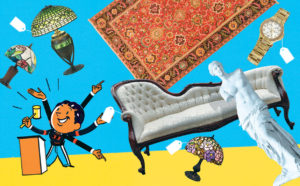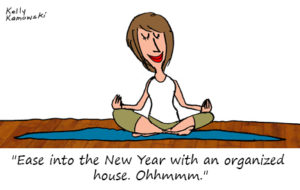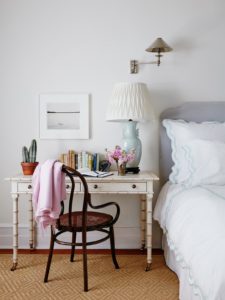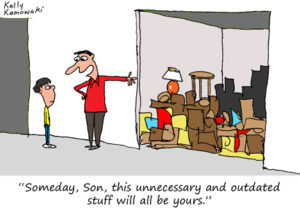 You’ve lived in your home for 25 years or more. Perhaps you raised your kids there. Maybe it was your parents’ home before it was yours. It contains the memories of your life, your children’s lives, your families lives, the life you had with a spouse.
You’ve lived in your home for 25 years or more. Perhaps you raised your kids there. Maybe it was your parents’ home before it was yours. It contains the memories of your life, your children’s lives, your families lives, the life you had with a spouse.
Every item in your home reflects something about you and the people you love most. Now the time has come, by choice or circumstance, to empty your home of all the memories so you can continue to live, more simply, perhaps more frugally, without the burdens home-ownership brings in later life. Now the real work begins.
As a professional organizer specializing in helping people just like you make this transition, I’m here to tell you it can be done. It seems overwhelming, impossible sometimes, but I have never, ever had a client not move on with their lives, as they planned. Is it easy? No. Is it stressful? Yes. There are few things harder in life than moving, except losing a loved one, and in some respects moving can feel just as painful, especially because it’s our memories we are leaving behind, not just our stuff.
This is why it is so, so important to know and constantly remind yourself why you are making this move in the first place.
Are you protecting your financial future?
Are you needing a simpler life?
Do you want to release yourself of the burden of taking care of a home that may be too big for you now?
When all is said and done, how will you know that you got there?
Take a moment and picture yourself done. You’ve moved.
You’re in your new home or your new community. What are you doing? Who are you with? How are you feeling? Are you enjoying the view outside your new home? Are you with family or friends you wanted to be closer to? Are you taking a walk in the neighborhood you knew would make you happy? Are you enjoying a new activity your move has made possible? Whatever the image is, picture it and keep that picture close to your heart.
Get as crystal clear as you can about this picture. You will need it to spur you on to keep moving when the chaos, albeit temporary, of moving is at its height and you find yourself wondering if you’ve done the right thing. I’m here to tell you, to reassure you. You have.
Memories are what make life rich and meaningful but so is living in the present moment. It is often the things or stuff of our lives that trigger those memories. We ask ourselves,”If I get rid of this or that will I lose the memory?” Yes, you may but not necessarily. Life is about creating new memories. If we had to remember everything that happened to us at every moment of our lives, a condition called hyperthymesia, you would be exhausted from the constant burden of non-stop, uncontrollable, stream of memories. Essentially you would be unable to live in the present.
When you are downsizing, it’s important to remember your future just as much as your past.









